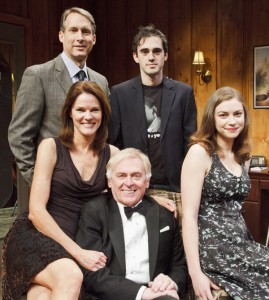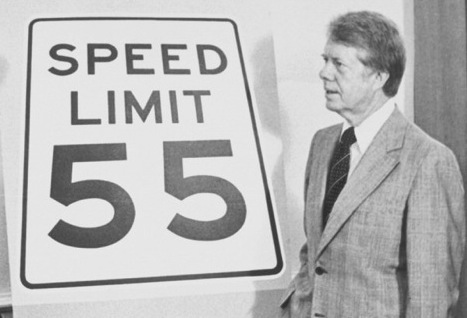I review the premiere of A.R. Gurney’s new play, Black Tie, in the Greater New York section of today’s Wall Street Journal. Here’s an excerpt.
* * *
Man cannot live by masterpieces alone, nor can any playwright, however gifted, hope to produce them every time he sits down at his desk. It is in the nature of things that there must also be well-made pieces of intelligent entertainment to keep our fancies tickled, and there must be enough of them to keep actors from standing on unemployment lines and critics from going mad with boredom. Therefore let us now praise A.R. Gurney, who writes a play or two each year, some of them inspired, others merely solid, but all guaranteed to send you home feeling that you wasted neither time nor money by seeing them. “Black Tie,” Mr. Gurney’s latest effort, falls into the second class, scoring 100% on the intelligent-entertainment checklist.
 “Black Tie” is the latest of Mr. Gurney’s reports from the land of the upper-middle-class WASP. The scene is a decent but undistinguished hotel in the Adirondacks where Curtis (Gregg Edelman) is about to throw a rehearsal dinner for his soon-to-be-wed son (Ari Brand). As he dons evening dress and mulls over his speech, the ghost of Curtis’ own late father (Daniel Davis) materializes to cheer him on and brush up his vocabulary: “Gentlemen wear trousers. Gents wear pants.” It soon emerges that Curtis needs a lot of cheering, for his son is about to marry a woman of multicolored hue who disdains the gentleman’s code that Curtis learned from his genial but ever-so-proper father….
“Black Tie” is the latest of Mr. Gurney’s reports from the land of the upper-middle-class WASP. The scene is a decent but undistinguished hotel in the Adirondacks where Curtis (Gregg Edelman) is about to throw a rehearsal dinner for his soon-to-be-wed son (Ari Brand). As he dons evening dress and mulls over his speech, the ghost of Curtis’ own late father (Daniel Davis) materializes to cheer him on and brush up his vocabulary: “Gentlemen wear trousers. Gents wear pants.” It soon emerges that Curtis needs a lot of cheering, for his son is about to marry a woman of multicolored hue who disdains the gentleman’s code that Curtis learned from his genial but ever-so-proper father….
One of the things I admire about Mr. Gurney is his iron professionalism. While “Black Tie” is slight by comparison with “The Grand Manner,” his last play, or “Sylvia,” which was so engagingly revived last month by Florida Repertory Theatre, it’s much more than sufficiently amusing. It never surprised me, but it never bored me….
* * *
The print version of the Journal‘s Greater New York section only appears in copies of the paper published in the New York area, but the complete contents of the section are available on line, and you can read my review by going here.
Archives for 2011
TT: Snapshot
An extremely rare kinescope of a 1957 episode of the short-lived TV version of Vic and Sade, Paul Rhymer’s comic radio serial, which was heard on network radio from 1932 to 1946:
(This is the latest in a weekly series of arts-related videos that appear in this space each Wednesday.)
TT: Almanac
“The desire not to destroy the palace but to move into it oneself has always been the occupational curse of revolutionaries.”
Wilfrid Sheed, “Writers’ Politics”
CAAF: The worst houseguests in the world
In 1822, Leigh Hunt, his pregnant wife and their six children moved into the ground floor of Lord Byron’s house in Pisa. As one scholar notes, “the [Hunt] children were encouraged to express their personalities rather than to submit to discipline.” Byron put it more colorfully, referring to the kids as “six little blackguards.”
But it’s Marianne Hunt’s own record of the stay that makes me laugh. From an 1822 diary entry:
Mr. Hunt was much annoyed by Lord Byron behaving so meanly about the Children disfiguring his house, which his nobleship chose to very severe upon. How much I wish I could esteem him more! It is so painful, to be under any obligation to a person you cannot esteem! Can anything be more absurd than a peer of the realm–and a poet–making such a fuss about three or four children disfiguring the walls of a few rooms. The very children would blush for him, fye Lord B.–fye.
Such a fuss about the disfigurement of only a few rooms! Fye!
CAAF: From Chekhov’s notebooks
Instead of sheets–dirty tablecloths.
The dog walked in the street and was ashamed of its crooked legs.
They were mineral water bottles with preserved cherries in them.
In the bill preserved by the hotel-keeper was, among other things: “Bugs–fifteen kopecks.”
He picked his teeth and put the toothpick back into the glass.
A private room in a restaurant. A rich man, tying his napkin round his neck, touching the sturgeon with his fork: “At least I’ll have a snack before I die”–and he has been saying this for a long time, daily.
If you wish women to love you, be original, I know a man who used to wear felt boots summer and winter, and women fell in love with him.
Entries quoted by James Wood in his essay “What Chekhov Meant By Life,” from The Broken Estate.
TT: Almanac
“It had always been a notion of mine that sanity is like a clearing in the jungle where the humans agree to meet from time to time and behave in certain fixed ways that even a baboon could master, like Englishmen dressing for dinner in the tropics.”
Wilfrid Sheed, In Love with Daylight
TT: The double nickel
I turned fifty-five on Sunday. Fifty-five was old when I was a boy. People back then used to settle into old age more quickly and, I think, somewhat more willingly. Now it’s the least noteworthy of landmarks–except for today’s demographers, who know it as the near side of the baby boom.
I read a sobering piece the other day about how boomers are so reluctant to admit the fact of their inexorably increasing age that marketers have been forced to accommodate them by resorting to what can only be described as systematic euphemism:
The generation that sent diaper sales soaring in the 1960s, bought power suits in the 1980s and indulged in luxury cars in the 2000s is getting ready to retire: The oldest boomers turn 65 this year. To accommodate their best customers’ needs, American companies are overhauling product lines, changing their marketing and redesigning store layouts.
But there’s a catch: Baby boomers, famously demanding and rebellious, don’t want anyone suggesting they’re old.
“We don’t do anything to remind boomers that they are getting older,” says Ken Romanzi, North America chief operating officer at Ocean Spray Cranberries Inc., which has targeted the health-conscious generation as its primary consumer base….
Bathroom-fixture maker Kohler Co. struggled to come up with a more palatable word for “grab bar,” which boomers resist. It introduced the “Belay” shower handrail–named for the rock-climbing technique–which blends subtly into the wall of a tiled shower. “When you say, ‘We’ve got beautiful grab bars,’ [boomers] just say, ‘Naw,’ because they don’t want to identify as needing that,” says Diana Schrage, senior interior designer at Kohler’s design center.
 I suppose I shouldn’t be too terribly surprised that a generation that grew up singing I hope I die before I get old has started to succumb to such undignified terror, though I may well find myself similarly disposed a decade from now. For the moment I’m perfectly delighted to be fifty-five, partly because I didn’t expect to make it here five years ago and partly because my life since then has been a more or less nonstop adventure.
I suppose I shouldn’t be too terribly surprised that a generation that grew up singing I hope I die before I get old has started to succumb to such undignified terror, though I may well find myself similarly disposed a decade from now. For the moment I’m perfectly delighted to be fifty-five, partly because I didn’t expect to make it here five years ago and partly because my life since then has been a more or less nonstop adventure.
Regular readers of this blog won’t need to be told what I’ve been up to, but if you’re dropping in for the first time, here’s a capsule guide to current events:
• My first opera libretto was successfully premiered by a major company a year and a half ago, and my second one will be produced in April.
• I published a best-selling biography a year ago and am now hard at work on what I hope will be an equally well-received sequel.
• I just wrote and directed my first play, and got the idea for another one a couple of days ago.
• On top of all this, I have the best day job in the world, and five years ago I met the woman who is now my wife.
Mrs. T, as it happens, is my near-coeval–she’s four days younger than me–and we plan to celebrate our dual birthdays and good fortune in an appropriate manner later this week.
I flew up to New York on Saturday morning to see a new play about a middle-aged WASP. I had lunch with a new friend and dinner with an old one, both of whom assured me that the best is yet to come. I certainly hope so, but I don’t see how it could be much better than the last five years have been.
I’m a lucky guy, married to a lucky gal. May our luck hold.
* * *
The Who play “My Generation” at Woodstock in 1969:
TT: Almanac
“I rail against writers who talk about the loneliness of it all–what do they want, a crowd looking over their typewriters? Or those who talk about having to stare at a blank page–do they want someone to write on it?
Wilfrid Sheed, interview, New York Times, Aug. 2, 1987
